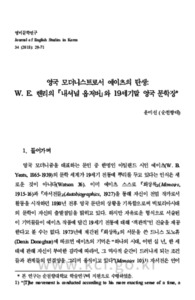

PARTNER
검증된 파트너 제휴사 자료
영국 모더니스트로서 예이츠의 탄생: W. E. 헨리의 『내셔널 옵저버』와 19세기말 영국 문학장 (Birth of Yeats as an English Modernist: W. E. Henley’s National Observer and the Literary Field in the 1890s)
43 페이지
최초등록일 2025.04.28
최종저작일
2018.06

-
미리보기
서지정보
· 발행기관 : 영미문학연구회
· 수록지 정보 : 영미문학연구 / 34호 / 29 ~ 71페이지
· 저자명 : 윤미선
초록
I attempt in this paper to reveal the profound influence the poet, critic, and editor William Ernest Henley (1849-1903) had on William Butler Yeats in the building of Yeats’s identity as an English Modernist. Yeats himself resisted acknowledging this influence in his Memoirs (1915-16) and Autobiographies (1927). This denial was part of Yeats’s myth-making of the Decadent poets of the Rhymers’ Club, which was necessary to develop further his own myth as a mature Modernist who had overcome the Rhymers’ solipsistic, jejune aestheticism.
It was actually Henley’s ‘counter-aestheticism’ that provided logic for Yeats in his vision that mature art should not be in pursuit of mere beauty but power. By focusing on the critical weekly National Observer (1888-1897), which was first founded as the Scots Observer in Edinburgh and which Henley edited, I show that the ‘counter-aestheticism’ it promulgated in its ‘Literary’ section was intertwined with the ‘new’ Conservative elitism of its imperialist ‘Political’ section. This alloy formed the ground against which Yeats debuted in the British literary field; most of Yeats’s poems and prose works collected in Poems (1895) and in Celtic Twilight (1893) first appeared in that weekly. Through this weekly, Yeats was made an ‘Irish’ and Celtic poet whose poems could exemplify the ‘manly’ atavism which Henley saw as key to reviving the pan-‘English’ nation that was suffering from aesthetic and political decadence.
The staunch Tory position of Henley as an opponent of Irish Home Rule remained a burden on Yeats so that Yeats would define the role of Henley as a mere editor of the journals where he happened to publish his works. The ‘masculine’ vitalist poetics of Henley’s own literary output, which emphasized the creative energy of poetical form and language, was, however, preserved in Yeats’s poems and ideas. Yeats’s poems in The Rose (1893), first published in the National Observer, receive special attention in relation to Henley’s The Song of Sword, and Other Verses (1892), which is noteworthy for its evolutionist sensibility of destruction and creation as well as its powerful images.영어초록
I attempt in this paper to reveal the profound influence the poet, critic, and editor William Ernest Henley (1849-1903) had on William Butler Yeats in the building of Yeats’s identity as an English Modernist. Yeats himself resisted acknowledging this influence in his Memoirs (1915-16) and Autobiographies (1927). This denial was part of Yeats’s myth-making of the Decadent poets of the Rhymers’ Club, which was necessary to develop further his own myth as a mature Modernist who had overcome the Rhymers’ solipsistic, jejune aestheticism.
It was actually Henley’s ‘counter-aestheticism’ that provided logic for Yeats in his vision that mature art should not be in pursuit of mere beauty but power. By focusing on the critical weekly National Observer (1888-1897), which was first founded as the Scots Observer in Edinburgh and which Henley edited, I show that the ‘counter-aestheticism’ it promulgated in its ‘Literary’ section was intertwined with the ‘new’ Conservative elitism of its imperialist ‘Political’ section. This alloy formed the ground against which Yeats debuted in the British literary field; most of Yeats’s poems and prose works collected in Poems (1895) and in Celtic Twilight (1893) first appeared in that weekly. Through this weekly, Yeats was made an ‘Irish’ and Celtic poet whose poems could exemplify the ‘manly’ atavism which Henley saw as key to reviving the pan-‘English’ nation that was suffering from aesthetic and political decadence.
The staunch Tory position of Henley as an opponent of Irish Home Rule remained a burden on Yeats so that Yeats would define the role of Henley as a mere editor of the journals where he happened to publish his works. The ‘masculine’ vitalist poetics of Henley’s own literary output, which emphasized the creative energy of poetical form and language, was, however, preserved in Yeats’s poems and ideas. Yeats’s poems in The Rose (1893), first published in the National Observer, receive special attention in relation to Henley’s The Song of Sword, and Other Verses (1892), which is noteworthy for its evolutionist sensibility of destruction and creation as well as its powerful images.참고자료
· 없음태그
-
자주묻는질문의 답변을 확인해 주세요

꼭 알아주세요
-
자료의 정보 및 내용의 진실성에 대하여 해피캠퍼스는 보증하지 않으며, 해당 정보 및 게시물 저작권과 기타 법적 책임은 자료 등록자에게 있습니다.
자료 및 게시물 내용의 불법적 이용, 무단 전재∙배포는 금지되어 있습니다.
저작권침해, 명예훼손 등 분쟁 요소 발견 시 고객센터의 저작권침해 신고센터를 이용해 주시기 바랍니다. -
해피캠퍼스는 구매자와 판매자 모두가 만족하는 서비스가 되도록 노력하고 있으며, 아래의 4가지 자료환불 조건을 꼭 확인해주시기 바랍니다.
파일오류 중복자료 저작권 없음 설명과 실제 내용 불일치 파일의 다운로드가 제대로 되지 않거나 파일형식에 맞는 프로그램으로 정상 작동하지 않는 경우 다른 자료와 70% 이상 내용이 일치하는 경우 (중복임을 확인할 수 있는 근거 필요함) 인터넷의 다른 사이트, 연구기관, 학교, 서적 등의 자료를 도용한 경우 자료의 설명과 실제 자료의 내용이 일치하지 않는 경우
“영미문학연구”의 다른 논문도 확인해 보세요!
-
인위성의 비판: 모리스의 『노웨어에서 온 소식』과 라파엘전파, 낭만주의 29 페이지
This study of William Morris’s News from Nowhere perceives artificiality as the main target of his social criticism in the novel. Artificiality, according to him, permeates every area of Victorian soc.. -
트라우마 이론 연구의 새 지평 열기: 탈식민주의 트라우마 연구와 신디고 마고나의 『어머니가 어머니에게』를 통해서 24 페이지
The present study begins with a recognition of the urgent need to resolve the problem of challenges to the value and effectiveness of trauma theory as the limitations of trauma theory research have be..
문서 초안을 생성해주는 EasyAI
